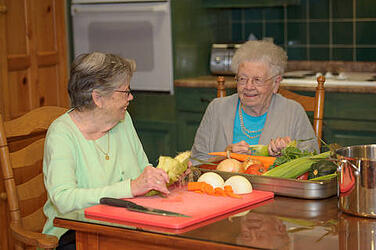 With so many Americans committed to eating right, it’s not exactly surprising that food manufacturers are responding with more fat-free, sugar-free and low-sodium options than ever. However, distinguishing healthy foods from “healthy” foods can be a challenge, particularly when it comes to promoting nutritious eating habits for your aging loved one. These four foods may be less healthy than you think.
With so many Americans committed to eating right, it’s not exactly surprising that food manufacturers are responding with more fat-free, sugar-free and low-sodium options than ever. However, distinguishing healthy foods from “healthy” foods can be a challenge, particularly when it comes to promoting nutritious eating habits for your aging loved one. These four foods may be less healthy than you think.
Granola Bars
Granola is a healthy treat when eaten in moderation. This protein-rich snack is packed with oats, nuts and other good-for-you ingredients. But many granola bars are a completely different story; in some cases, the words “granola bars” and “candy bars” are nearly interchangeable. Why? Because most store-bought granola bars are shockingly high in sugar, high fructose corn syrup and other sweeteners. If you are trying to watch your aging loved one's calorie intake, granola bars may be part of the problem, not the solution.
Fruit Juice
Going by the commercials alone, natural fruit juice is an essential part of any balanced diet. However, just because fruit juice is natural doesn't mean it's good for you -- particularly when so many bottled varieties contain minuscule percentages of natural juice and a heaping amount of added sugar. While fruit juice is acceptable in moderation, it’s always preferable to choose whole fruits instead. If your loved one's morning isn't off to a great start without a cold glass of OJ, consider making your own.
Breakfast Cereal
You can’t walk through the cereal aisle without being inundated with claims about each box's unique nutritional advantages -- from high fiber to vitamin D. But while cereal may be served up on tables across America as a simple, nutritious way to start the day, many are loaded up with artificial vitamins and minerals. Even cereals that parade as "healthy" options may contain a day's worth of your recommended sugar intake -- particularly troubling news for seniors with blood sugar issues. Opt for hot, whole grain cereals that have little or no sugar instead, like old fashioned rolled oats or plain instant oatmeal.
Yogurt
Yogurt is rich, creamy and delicious. Unfortunately, it can also be full of excess carbohydrates and sugar. Not only that, but many processed versions come without probiotic benefits. Skip the flavored varieties and instead seek out organic Greek yogurt, which contains live cultures. If your aging loved one scoffs at the taste of plain yogurt, try adding fresh fruit, honey or peanut butter to satisfy a sweet tooth.
In a perfect world, it would be easy to distinguish healthy foods from unhealthy ones, but with plenty of clever marketing tactics, it's not as simple as it seems. You can help your aging loved one make the right choices by paying careful attention to nutrition labels in order to determine whether so-called “health foods” offer real benefits or empty promises.
Key Takeaways
- Encouraging your aging loved one to eat well is only half the battle; the other half is distinguishing healthy foods from imposters.
- Reading food labels is the best way to determine whether food is truly healthy.
- When in doubt, avoid processed foods which typically lack the nutritional benefits of fresh, whole foods.

